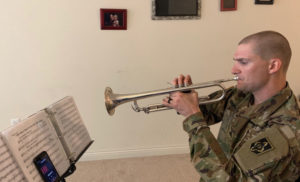Sam Campbell
FORT LEONARD WOOD, Mo. (May 4, 2020) — Social distancing protocols may have changed the way many are working, but the 399th Army Band is overcoming distance to stay sharp.
According to Warrant Officer 1 Michael Becker, 399th Army Band commander and bandmaster, members are practicing at home, and live performances have been put on hold for the most part, but the brass quintet small group is rehearsing for a limited-scope, outdoor retirement ceremony in May.
“The circumstances involved with rehearsing instruments can be a little bit different, so we’re taking extra precautions,” he said.
Becker added that they rehearsed standing farther apart and emptying the instruments’ saliva valves into a trash can to help eliminate any possibility of contagion.
Brass quintet team lead Sgt. Aaron Johnson said sheet music is now put out in advance to enable practicing from home. He added that band members have adapted to the changing landscape by adopting more personal responsibility.
“In the past, we could get away with more frequent rehearsals, but now we’ve got to be much more diligent in the personal practice side of things,” he said. “It really requires a disciplined schedule for yourself, not dedicating too much time to this or that. Just a warm up each day at a minimum can do wonders to keep a musician sharp.”
Other band members said the spread of COVID-19 has encouraged them to pursue audiences through technology.
“With music being such a universal language, it’s another way of communication,” said Spc. Anthony Barnwell, a trumpet player with the 399th’s brass band. “I think this pandemic proves that we can still perform for an audience through a different means … even if that’s just making a fun recording and putting it on social media or getting something together just to play for my family.”
He said the virus has not discouraged him or lessened the love he has for his work.
“This pandemic might take away a lot of our live interactions, it might cancel some of our live performances, graduations,” Barnwell said. “But no matter what happens, you’re not going to take away my passion for music.”
He said he and his fellow band members do not view their duties as merely jobs, but instead, lifestyles.
“We’re in this because we enjoy doing this,” he said. “This isn’t a typical nine-to-five job, where you clock in, you come home and then boom, you’re done for the day. A good amount of us, even after 5 p.m., (are) playing long tones, looking up method books, equipment, ways for us to get better.”
Spc. Tatiana Preziuso, who plays the flute and fife in the band, said that between virtual rehearsals with her woodwind trio, she has been volunteering her spare time to teach musical master classes through video conferencing applications.
“With music, there are so many things that you can do online still,” she said. “We’re very lucky with the world we live in now, with all of this technology that everyone (can) have access to.”
She said some applications allow musicians to collaborate from their own homes.
“It’s no different than actually being there, rehearsing with that person because it encourages practicing, (and) you’re still communicating,” Preziuso said. “You can basically have a whole orchestra do this together and create a piece of music together.”
Becker said the band adjusted quickly to new requirements resulting from the virus, and that it was proactive in keeping working relationships thriving; he believes daily contact is important to maintain positive morale.
“That’s one thing that we started to do right from the onset, when everyone was working from home,” he said. “I’ve had all my leaders contact their direct subordinates every day and talk to them for 10 minutes and see how things are going – not necessarily talk about work.”
And his band is thankful for the opportunity to continue playing music.
“The fact that I’m still able to practice from home, that I’m still able to do these projects from home … it’s still spreading the joy of music around,” Barnwell said. “It’s a lot better than just keeping my horn in my case, picking it up in the next few months with the cobwebs in there.”


-30-
About Fort Leonard Wood
Fort Leonard Wood is a thriving and prosperous installation that has evolved from a small basic training post more than 75 years ago to a premier Army Center of Excellence that trains more than 80,000 military and civilians each year.
Fort Leonard Wood is home to the U.S Army Maneuver Support Center of Excellence and three U.S. Army schools: the U.S. Army Engineer School; U.S. Army Chemical, Biological, Radiological and Nuclear School; and the U.S. Army Military Police School. In addition to training engineer, CBRN and military police specialties for the Army, Fort Leonard Wood also provides gender-integrated in-processing and Basic Combat Training for new Soldiers.
Fort Leonard Wood also hosts and trains with the largest Marine Corps Detachment and Air Force Squadron on any Army installation as well as a large Navy construction detachment.
More information about Fort Leonard Wood is at: https://home.army.mil/wood/index.php/about/mission
